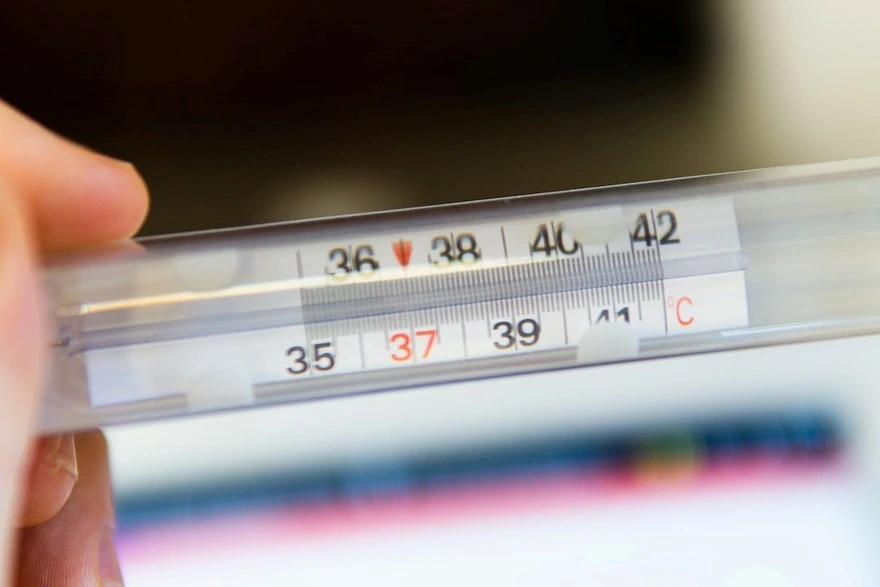fever panel test
Fever Profile Test: What It Is and What To Expect?
What is the Purpose of a Fever Panel Test? If you are wondering what a fever profile test is and why you need it, you are in the right place. A fever profile test is a type of blood test for adults that can serve many functions, from diagnosing the root causes of an unexplained fever to providing physicians with a comprehensive screening to produce results related to the different kinds of ailments caused by the fever. The following are some of the reasons why your doctor may suggest a fever profile test for you. To diagnose illnesses like dengue, malaria, or typhoid. Detecting diseases early, results in speedy treatment and recovery. If you are suffering from chronic low-grade fever. If you see the typical symptoms of typhoid fever, such as diarrhoea, abdominal pain, headaches, weight loss, muscle weakness, skin rashes, and loss of appetite. If you exhibit symptoms of malaria, like fever, headaches and shaking chills. When Do You Need To Get A Fever Panel Test Done? Your doctor may suggest getting a fever profile blood test if you experience any or all the symptoms mentioned below for over two days: Severe body ache Vomiting Loss of appetite Headaches Diarrhoea How to Prepare for a Fever Panel Test? While a fever profile test does not need any specific preparations, you must let your doctor know about any medications you are taking or have taken that may affect these results. Sometimes, your doctor may advise you to fast for at least 8 to 10 hours the night before the test. However, you have to keep drinking water to avoid dehydration. How Many Tests are Included in a Fever Profile? A fever profile test consists of multiple blood tests to check various parameters in the body. The fever profile blood test list includes: Complete haemogram (CBC, ESR): It is a comprehensive blood test that provides information about various components of blood. Typhoid Dot IgM: This immunoglobulin M (IgM) antibody test is used for the diagnosis of typhoid fever caused by Salmonella typhi bacteria. Peripheral smear for malaria: This is a microscopic examination of a thin blood film to detect the presence of malaria parasites. Urine routine examination: This test involves the analysis of a urine sample to evaluate various parameters, such as colour, appearance, pH, specific gravity, protein, glucose, ketones, red and white blood cells, and bacteria. Serum glutamic pyruvic transaminase(SGPT): This test is commonly used to assess liver function, diagnose liver diseases such as hepatitis, monitor the effectiveness of treatment, and monitor for potential liver toxicity caused by certain medications or substances. Aerobic blood culture: This culture is performed to identify and isolate bacteria or fungi present in the bloodstream. It is crucial in diagnosing bloodstream infections, such as sepsis, and determining the causative organisms. Dengue Antigen NS1, dengue IgG and IgM: These are blood tests used for the diagnosis of dengue fever, a viral infection transmitted by mosquitoes. The technician or your doctor will take around 4ml of blood as a sample for the various tests and 3ml of blood serum. This sample is through a needle in the vein directly into a vaccutainer. They may also ask you to collect 10 ml of urine on the spot in a sterilised container given by the lab technician during the fever profile test. Are There Any Risks? During a fever profile test, a small amount of blood is collected from you using a needle and syringe. This procedure is relatively quick and painless, and the risks associated with it are minimal. What Do the Fever Profile Test Results Mean? A fever profile test report is not easy to understand as it includes various tests. Each test has different parameters to understand and evaluate before your doctor can conclude what it means. Some of the fever profile test interpretations include High neutrophil count: Presence of a bacterial infection. Positive Widal test: Typhoid fever. Presence of malarial parasite on peripheral smear: Malarial infection. The results of the routine urine test can indicate a urinary tract infection. When Should I Go for a Fever Profile Test? A fever profile test is a diagnostic procedure recommended if you are experiencing a persistent fever accompanied by flu-like symptoms such as vomiting, diarrhoea, headaches, fever, and chills lasting for more than two days. This test aims to provide a comprehensive evaluation of your condition by examining various aspects related to the fever and associated symptoms. Conclusion Now that you know how many tests are in a fever profile, what is a fever profile test, and what to expect when carrying out the test, it is essential to find a reliable testing centre. Metropolis Labs is a trusted diagnostic centre in the country with multiple labs, and convenient home testing options focused on giving our customers the best service. Contact us today to check out our fever profile test and other services we offer.
Get Sick of Changing Seasons Too Easily? This Could Be the Cause
Every time we observe a change in seasons, many of you may complain of stuffy nose, scratchy or sore throat, constant sneezing, watery eyes, mucus draining from your nose into your throat, high fever, muscle aches etc. There may be multiple causes to it. However, experts say a favorable environment for microbial growth and possible reduction in your immunity levels are the two important reasons. Surge of viruses and allergens in the air: We come down with a cold or flu with seasonal change and this temperature shift makes way for viruses to flourish. While we think the change in the temperature is the cause behind it, changes in the weather conditions accompanied by the growth of certain viruses during this time is primarily responsible for the increasing rate of illness. The weather itself does not make you fall sick; the germs do. For example, seasonal allergies due to weeds like mugwort or ragweed etc. are due to conditional occurrences and not related to drop in temperatures that cause us to be sick. Make sure to get a fever panel test done for correct diagnosis when you notice symptoms. Immune system being too busy: With the onset of summer, people are generally hit a little harder as all the flower pollen gets released in the air. The immune system in such cases gets occupied with fighting and reacting to these allergies, thereby leaving the body more vulnerable to other viruses. Fluctuating temperatures may reduce the resistance of the immune system, making people fall sick frequently. During winter months: We are more confined indoors, which increases chances of disease transmission due to low and dry heating and poor ventilation, making us susceptible to diseases. Likewise, working indoors, such as confined office spaces, schools, office buildings, restaurants etc., also makes it easy for the viruses to spread. In the winter months, the level of vitamin D intake reduces, which is considered an important element for a healthy immune system, but again it gets compromised, leaving doors for viruses to enter. The most common of these viruses being the Human Rhinovirus (HRV) found predominantly during spring and winter. The flu-causing influenza virus spreads when the air is dry and cold, especially during winters. Breathing in cold and harsh dry air can also result in narrowing of blood vessels in the upper respiratory tract that conserves heat, resulting in the white blood cells unable to reach the mucous membrane and harder for us to fight these germs and viruses. How to keep safe from seasonal sickness during weather changes? Being precautious by following certain lifestyle changes can help dodge that running nose, sneezes, rashes etc. There are a lot of ways that can either help prevent or decrease the chances of seasonal illness. Some of them being, Drink plenty of liquids: Staying hydrated at most times is vital. Keep yourselves properly hydrated because we may not realize it as the air is drier; hydration helps in the long run. Drinking enough water helps you flush out all the toxins, clear out mucus from your body, and keep your nasal passage and throat moist, giving less chance for bacteria to stick around. Getting a diagnosis on time: Most diseases that cause inflammation can result in fever. It becomes important to find out the real cause behind it, and get started on treatment accordingly. Every year with seasonal changes hitting different parts of India, people suffer from fevers including Dengue, Malaria etc. Getting a fever panel test package helps in identifying the cause and getting to the right treatment. Fever panel test price is affordable for all; one should consult an expert and get the basic fever tests done. Regular exercise: Exercising improves blood circulation and helps keep the immune system strong, which in turn helps combat the viruses and lowers the risk of getting infected with seasonal changes, sickness or fever. Well balanced diet and rest: Incorporating fresh fruits and vegetables in the meal, taking the ideal amount of vitamins and minerals followed by plenty of restorative sleep and rest, helps keep the body in check and gives it the power to fight off diseases. Practice proper hygiene: The global pandemic has already taught us the importance of good hygiene, washing hands regularly, avoiding touching surfaces such as door knobs or switches, covering your face while coughing or sneezing etc. This helps reduce the potential risk of infections for us as well as others around us. Another habit raised from the pandemic is the use of masks as a beneficial preventive measure to avoid catching viruses and falling sick frequently. Get vaccinated: With the shift from one season to another, the viruses constantly change and are often unknown, it is best advised to get a flu shot for prevention. Apart from these, get 8-hour sleep, stay indoors when sick, consult a doctor when allergies persist for longer durations etc. are some measures that can help prevent you and your family from getting stuck in this maze of seasonal changes. While these certainly can’t control the cold or the warm temperatures, they can at least ensure healthy living that will keep diseases at bay. Each season is unique and is looked forward to for different reasons. Don’t be just stuck with the thought of getting sick with cold, coughs, sniffles etc.
 Home Visit
Home Visit Upload
Upload
















 WhatsApp
WhatsApp